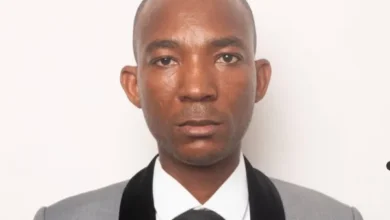Conservationists express worry over capture of African Civet in Ekiti

By Samuel Ogunsona
Plant and animal conservationists have expressed deep concern over the recent capture of African Civet in Ekiti by a local hunter.
The incidence took place early this week at Igbara Odo.
The hunter had wounded the animal and then tied him into stake hopefully for a meal.
Ekiti has been in the forefront of conservation of plants and animals courtesy of the State Governor, Mr Abiodun Oyebanji and the Director General, Ekiti State Tourism Board, Mr Wale Lanre Ojo who has personally led breakthroughs in his drive to put Ekiti on the global tourism map.
The hunter had displayed the African Civet struggling to free himself from the stranglehold.
Speaking to Irohinoodua, Mr Taiwo Adeleye of the Nigerian Human Rights Community, (NHRC) said Ekiti is home to many endangered species including but not limited to gorrilas, reptiles, birds and even Bufaloes.
“The hunter did not kill the African Civet which was a good development. This reflects the campaign of the Ekiti State Government to preserve some threatened species,”he told Irohinoodua.
He said he was confident the State Government would intervene to prevent the captured Civet.
The African Civet is found in the forests and Savannas of Nigeria, though not endangered, but experts say a silent threat looms over non-endangered wildlife species in a general sense.
Despite conservation efforts focusing on protecting endangered species, those not yet on the brink of extinction are frequently overlooked, said one wildlife official in Ekiti who does not wish to be named.
Adeleye said species like African Civet are equally vulnerable to habitat loss, poaching, and human-wildlife conflict.
The incident in Ekiti state, where a hunter captured and presumed planning to to kill a live Africa Civet, has then raised fresh concern about the protection of wildlife in Nigeria.
The Africa Civet, listed as “Least Concern” by the International Union for Conservation of Nature (IUCN), is facing declining population trends due to habitat loss and hunting.
This incident is not an isolated case. In 2017, The Nation Newspaper reported a similar incident in Benin City, where a local vigilante killed an African Civet, locally known as “Edi,” at Fanalou Street, Off Country Home Motel Road, Ugbor.
The pictures of the s Civet were posted on Facebook by Hon Tony Osazuwa and shared by Benin-based lawyer Jefferson Uwoghiren, who initially described it as a “daredevil leopard.”
However, the animal was later identified as a civet.
Uwoghiren’s post read, “My brother, Hon Tony Osazuwa few minutes ago posted Images of a dare devil leopard killed early this morning by the local vigilante in his area Nigeria. Leopards in Benin?” Darlington Ehondor commented,
“This beautiful cat shouldn’t have been killed, it should have been shot with tranquilizers and, when revived, housed in a zoo or some wildlife facility.
“So sad we blissfully destroy items of great potential tourist and economic value.”
In 2019, Premium Times reported another incident in Akwa Ibom state, where young men killed a civet, referring to it as a “terrorist” due to its attacks on fowls in the village.
A Facebook user, Mfon Japhet, posted, “I was in the village today (Ikot Akpan Anwa) and this terrorist was killed by my boys.”
The post sparked mixed reactions, with one user rebuking the hunters, saying, “You are the only terrorist here, killing the poor animal.”
Another user disturbingly commented, “This is a very good catch. Wonderful meat”
Dr. Mark Ofua, a dedicated Nigerian wildlife conservationist known as the “Snake Man of Lagos,” spoke about the lack of knowledge among locals regarding wildlife conservation.
In a recent interview with Mongabay, he said, “The believe of many Nigerians is that animals doesn’t extinct, they believe that they’ve gone deeper into the forest. To them, the forest is infinite, it doesn’t end. Another concept they don’t have is zoonosis. They don’t believe we can get diseases from animals.
“When I tell them about the government stance on animal protection, they say, ‘No,’ it’s just the government’s interest to get them off bushmeat, and that’s why they’re cooking up those stories.”
However, the plight of Nigeria’s non-endangered wildlife species demands immediate attention and action. Habitat loss, poaching, and human-wildlife conflict are pushing these species towards decline, and without swift intervention, the consequences could be catastrophic.
“The government must prioritize conservation efforts, raise awareness, and enforce protection laws to safeguard these species.” says Akinola David, a recent graduate of Zoology from Lagos State University.
“Time is of the essence. Nigeria’s unique wildlife heritage hangs in the balance. The government must act fast to protect these species, not just for their survival but for the ecosystem’s integrity and the nation’s ecological future.”
The Director General of Tourism in Ekiti state was contacted for insights on wildlife conservation efforts but did not respond to questions sent to him as at press time.
Experts emphasize the need for concerted conservation efforts to protect Nigeria’s wildlife, including species not yet endangered. Other species, like the Nigerian-Cameroon Chimpanzee and the African Elephant, are also struggling due to habitat destruction and poaching.
The recent incident in Ekiti state shows the complex relationship between humans and wildlife in Nigeria, and the need for increased awareness and protection of non-endangered species, said another official.
As conservation efforts often focus on protecting endangered species, those not yet on the brink of extinction are frequently overlooked, leaving them vulnerable to habitat loss, poaching, and human-wildlife conflict, the official said.





